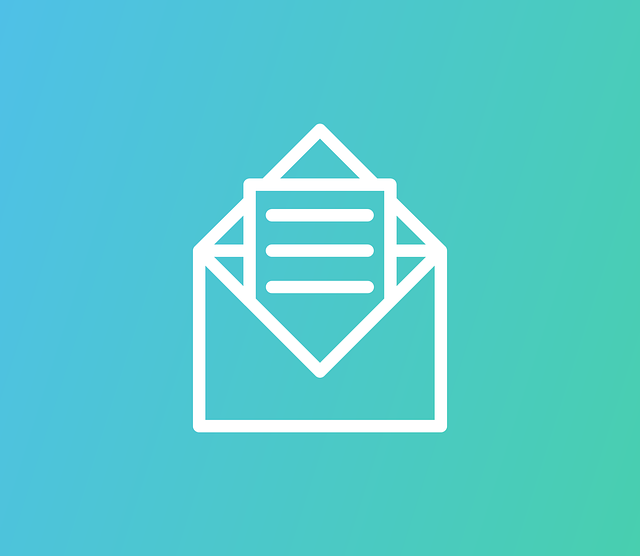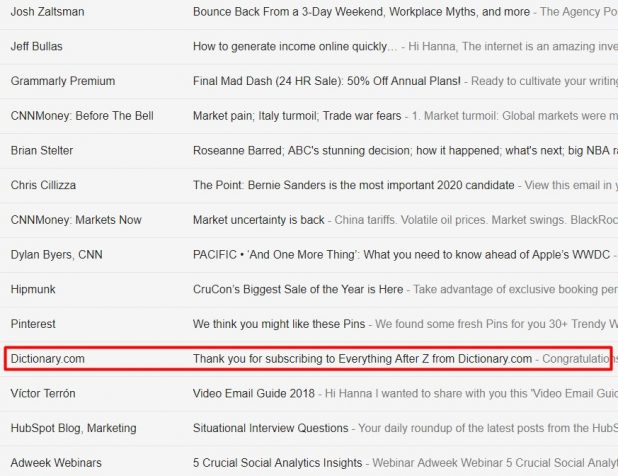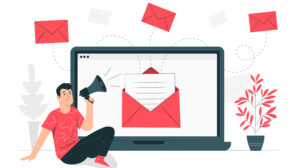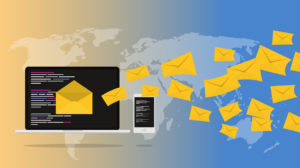On the Internet, there are loads of welcome email examples that might inspire you. Yet, you need to learn the basic tips on how to create effective messages by using welcome email templates.
Recommendations for creating best welcome emails
You, certainly, know that welcome emails, aka onboarding ones, are the first messages customers receive from a company. So, they are meant to comfort and welcome your new subscribers.
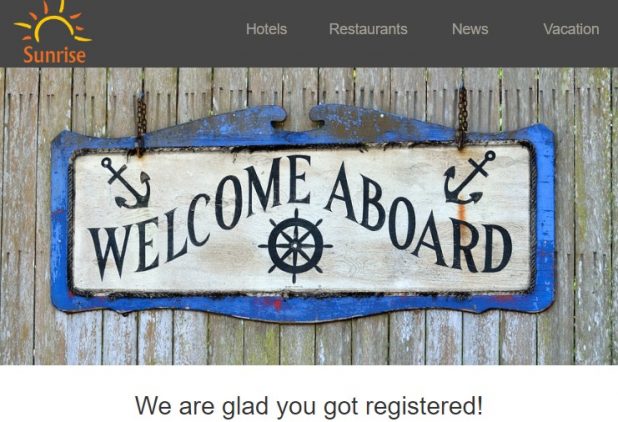
1. Apply a descriptive subject line
Definitely, after opening your email, customers are likely to recognize who you are. Yet, you need to let them know it from the very beginning.
Make sure your sender’s name is correct, and the subject line is not selling. Don’t scare the customers away.
This subject line is pretty descriptive. For example, Nike and Adidas use “You’re in”. Certainly, you may use something like “Welcome”.
In this case, your email’s content should correspond to the subject line.

2. Share the story of your brand
Why not share your brand story like Tiffany does? Most people would love to find out that not only is your company popular now, but also has been on stage for quite a long time. The more customers know about your history, the more they’ll like your brand.
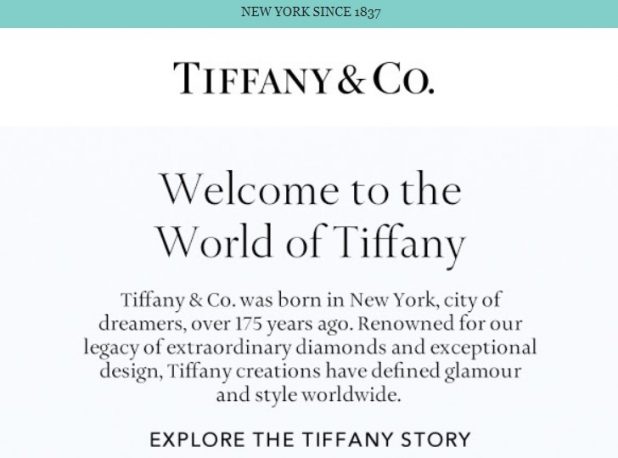
3. Ask subscribers to set preferences
When giving consent to receiving newsletters from you, people hope to get only useful and relevant information. Gentlemen might not like to receive emails with female clothes and flicky-chicky movies, especially if they are single. Let subscribers set the preferences before you send your first email to them.
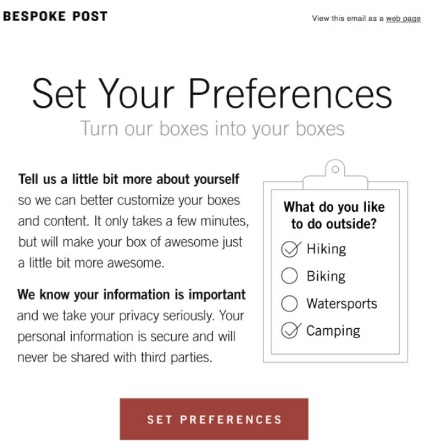
4. Shed light on your products
Of course, once people are registered with your website, they are likely to be familiar with your products or with your company. But what if they aren’t? Help subscribers get familiar with your most popular items fast.
Or why not recommend them something to start with since you know your products better?
Take a look at a perfect example of welcome emails by Skillshare:
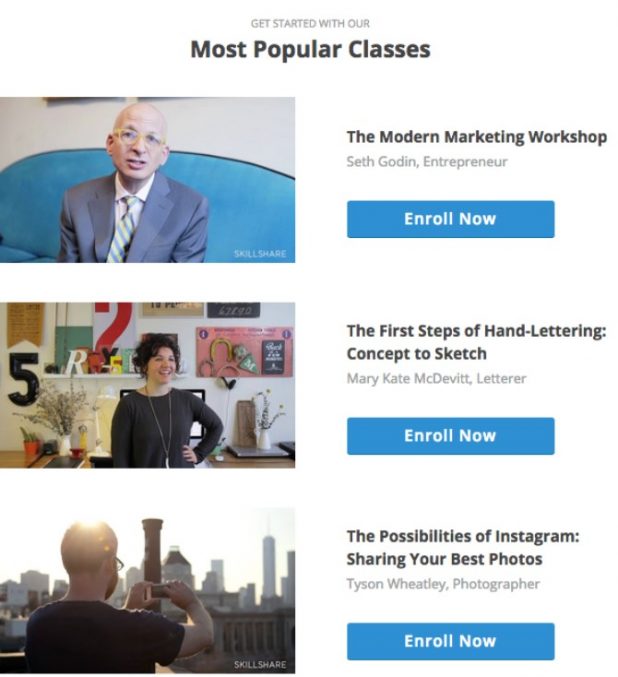
5. Teach how to use your products
If you sell garments, there is no need to explain how to use those. But if you sell some apps or online tools, do subscribers a favor — show them how to use your apps.
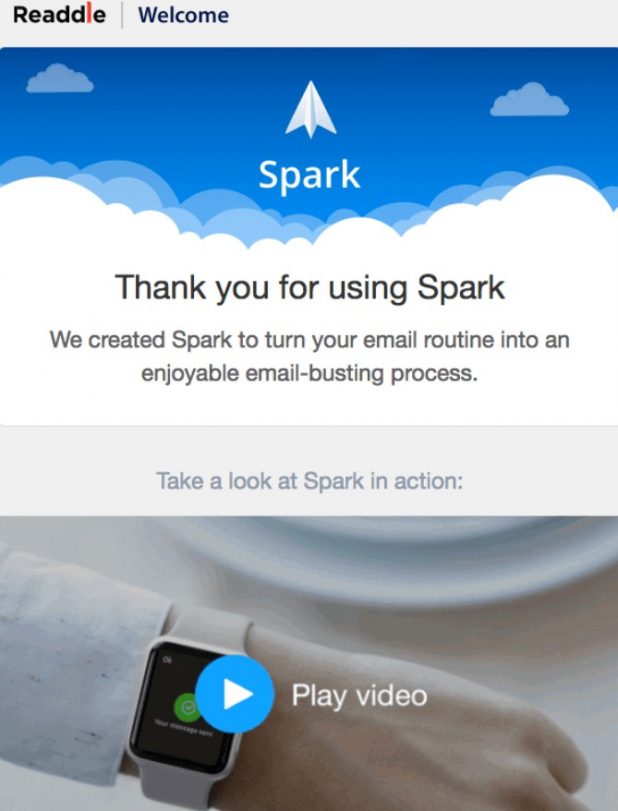
6. Offer treats
Certainly, we all register and subscribe to blogs and newsletters in order to hear about the latest news and trends. But almost everyone loves discounts.
This simple trick may convert passive subscribers into active users. Try this out and watch your Google Analytics reports.

7. Describe the advantages of using your products
There is no doubt that a great service is a valuable treat. Explain to prospects why they can trust you and why they should choose your company from among the thousands of others.
8. Set expectations
How many emails are you going to send? What will they be about? You definitely need to let your customers know about it beforehand. This will prevent them from being irritated, will prevent you from being reported for spam (yes, recipients often do that when they are annoyed), and will probably make them wait for your newsletters with anticipation.

Note: if you run through your inbox you will notice that many welcome emails start with “You’re gonna be the first to….”? If it’s a commonly used phrase, you might want to avoid using it. Create your own catchy one.
9. Let newcomers follow you on social networks
Many new clients might like to follow you on social to stay informed. Give them this opportunity.
Yes, certainly, you include these links in all of your emails; yet as long as your message is a greeting one and you are only introducing your company, why not make your social network icons big and noticeable?

10. Provide new customers with testimonials
Make sure you share only real feedback, given by real people with active accounts on social networks. Yes, many people check even that kind of information.

Subscription confirmation emails
This type of email should be mentioned here althpogh not a welcome message. Subscription confirmation emails proceed the welcome ones.
1. Use double opt-in
Double opt-in prevents you from sending unsolicited newsletters because you make people accept your privacy policy, and make them give you their consent for receiving emails. Also, by using this method of registration, you ask potential customers to check their email address… and double-checking will also help you avoid blacklists.

Note: As of May 28 2018, you are not allowed to use single opt-in registration, according to EU GDPR rules.
2. Send confirmation emails in a timely manner
No time wasting allowed here. Make sure you send these emails the very moment a person entered his or her email and clicked the “subscribe’ button.

What is special about this example? The Krrb company is probably the only one that lets its customers edit email addresses or enter new ones.
Summary
1. Use double opt-in, stick to the EU GDPR rules even if you are not an EU citizen.
2. Send email address confirmation messages on time.
3. Use creative yet simple subject lines.
4. Keep your welcome email short and informative.
5. Don’t use all these tips in one email as it may become too long and nobody will read it to the end.
6. Stay on-brand — apply a logo, corporate colors, and standard email elements, like a footer.
7. Keep your email design simple and focus on text.
Subscription confirmation and welcome emails are the first messages your customers see. Thus, they build a first impression about your company.
Get inspired by the welcome email examples above. And by using Stripo email, create emails your customers will truly like.
It solely depends on you what subscribers will think about your brand.


